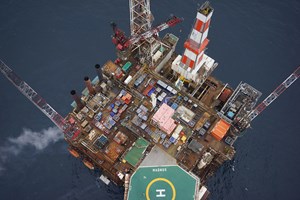North Sea oil and gas license ban may factor into UK’s green strategy

(Bloomberg) --The UK government could still ban new oil and gas exploration licenses, after releasing a strategy to support the North Sea transition that environmental groups said was at odds with its plans to eliminate greenhouse gas emissions.
Energy Minister Anne-Marie Trevelyan said the UK could eventually follow in the footsteps of North Sea neighbor Denmark which will stop offering new oil and gas licenses and end production by 2050.
The North Sea transition deal published Wednesday sets out a path to attract investment into renewable energy, carbon-capture and storage, and hydrogen. Spending of as much as 16 billion pounds ($22 billion) by 2030 -- shared between the government and industry -- should reduce emissions and create as many as 40,000 jobs across the supply chain, according to a statement from the Department of Business, Energy and Industrial Strategy.
“In due course we might” introduce a ban, Trevelyan said. “We’ve taken the view that at this point on the journey to net zero, we want to invest in the sector, make sure that we can work with them.”
Investment Slump
The absence of a firm ban on exploration prompted criticism from environmental campaigners and analysts.
The oil and gas licensing decision is “kicking the can down the road” until the world is not looking, said Luke Murphy, head of the environmental justice commission at the Institute for Public Policy Research. “If the government’s proposed ‘climate compatibility checkpoint’ were a meaningful test it would almost certainly mean an end to new licenses.”
The industry body Oil & Gas UK, on the other hand, said the deal would safeguard UK energy security and support the economy.
The plan comes at a time when the UK oil and gas industry is struggling to recover from an investment slump caused by the coronavirus. Even before the Covid-19 crisis, the North Sea had undergone dramatic changes as many major companies departed from aging fields. Oil production fell by more than half in the past two decades and is expected to decline further.
For now, the UK, is working on developing new climate criteria for any new licenses, which Trevelyan said would be released by the end of this year. The idea is to ensure exploration and production licenses are only granted if they don’t undermine the nation’s climate goals and they could include dealing with unabated flaring or the electrification of platforms, she said.
Oil and gas licenses are usually awarded on an ad hoc basis, but no new certificates were handed out last year as demand fell as a result of falling prices and demand due to the pandemic. Exploration on the UK continental shelf is already dwindling as resources become scarce and investment is diverted to other regions, dropping to the lowest since 1965 last year, according to Oil & Gas UK
The government said the new agreement requires certain commitments from the sector. It should reduce emissions 10% by 2025, 25% by 2027, and 50% by the end of the decade. But that’s less ambitious than the “balanced pathway” outlined by the independent Climate Change Committee.
The government also said it will no longer provide financial support for fossil fuel projects overseas from March 31, “with very limited exceptions.”
Aging Fields
By 2030, the sector will also voluntarily commit to ensuring that 50% of its offshore decommissioning and new energy technology projects will be provided by local businesses. It plans to appoint an industry supply-chain champion who “will support the coordination of local growth and job opportunities.”
“We need to urgently end our reliance on fossil fuels,” Trevelyan said in the statement. “Through our pioneering North Sea Transition Deal, we will do so without putting our economy and communities at risk.”


